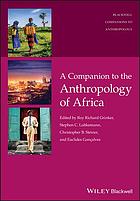

Most ebook files are in PDF format, so you can easily read them using various software such as Foxit Reader or directly on the Google Chrome browser.
Some ebook files are released by publishers in other formats such as .awz, .mobi, .epub, .fb2, etc. You may need to install specific software to read these formats on mobile/PC, such as Calibre.
Please read the tutorial at this link: https://ebookbell.com/faq
We offer FREE conversion to the popular formats you request; however, this may take some time. Therefore, right after payment, please email us, and we will try to provide the service as quickly as possible.
For some exceptional file formats or broken links (if any), please refrain from opening any disputes. Instead, email us first, and we will try to assist within a maximum of 6 hours.
EbookBell Team

0.0
0 reviewsThe study of the cultures of Africa has been central to the methodological and theoretical development of anthropology as a discipline since the late 19th-century. As the anthropology of Africa has emerged as a distinct field of study, anthropologists working in this tradition have strived to build a disciplinary conversation that recognizes the diversity and complexity of modern and ancient African cultures while acknowledging the effects of historical anthropology on the present and future of the field of study.
A Companion to the Anthropology of Africa is a collection of insightful essays covering the key questions and subjects in the contemporary anthropology of Africa with a key focus on addressing the topics that define the contemporary discipline. Written and edited by a team of leading cultural anthropologists, it is an ideal introduction to the most important topics in the field, both those that have consistently been a part of the critical dialogue and those that have emerged as the central questions of the discipline’s future.
Beginning with essays on the enduring topics in the study of African cultures, A Companion to the Anthropology of Africa provides a foundation in the contemporary critical approach to subjects of longstanding interest. With these subjects as a groundwork, later essays address decolonization, the postcolonial experience, and questions of modern identity and definition, providing representation of the diverse thinking and scholarship in the modern anthropology of Africa.